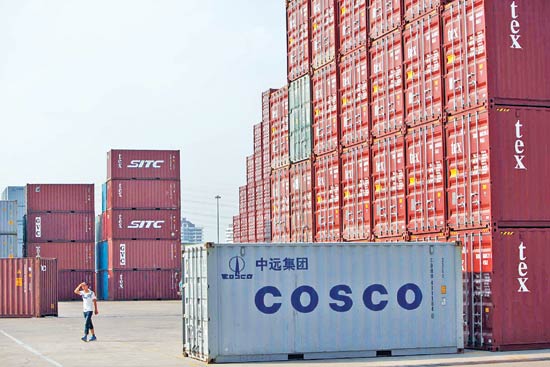Statistics
China reports bigger trade surplus
By Ding Qingfen (China Daily)
Updated: 2011-05-11 09:19
 |
Large Medium Small |
|
 A container port in Shanghai. China posted its biggest trade surplus in four months in April, swinging from a trade deficit in the first quarter. [Photo/Agencies] |
The authorities announced on Tuesday that April exports rose 29.9 percent from a year earlier to $155.7 billion, and imports increased by 21.8 percent to $144.3 billion.
China reported trade surpluses of $11.42 billion in April and $139 million in March.
"As China's tightening measures to cool the economy choke back liquidity of capital, imports of commodities dropped and import growth is lower than expected," said Li Wei, an economist from Standard Chartered Bank (China) Limited.
| ||||
Imports of iron ore by volume fell by 11 percent, and copper dropped 14 percent from the March figure, according to the Customs' data.
To curb inflation, China has raised interest rates four times since mid-October and has increased the reserve requirement for lenders seven times.
"The impact of tightening (on imports) will probably continue during the next few months," Li said.
"Overseas demand is still strong and the economies of the United States and the European Union (EU) are recovering well," said Zhou Shijian, a senior trade expert from Tsinghua University.
From January to April, China's overseas shipments of coke grew by 409 percent and precious metals surged by 111 percent.
Exports of mechanical and electrical goods, which accounted for 57.6 percent of the nation's exports, rose by 22.9 percent year-on-year to $319.8 billion in the first four months of this year
China's April exports to the EU rose by 19.7 percent. In the same month, Chinese exports to the US rose by 22.4 percent, while those to Japan grew by 27 percent.
"This suggests that the demand from developed economies may have been stronger than we thought," said Wang Tao, head of China Economic Research with UBS Securities.
"We do not expect the April data to have any obvious impact on the pace and magnitude of the appreciation of the renminbi," she said.
At the recent Canton Fair, Chinese manufacturers and exporters complained that the appreciation of the Chinese currency and the rising cost of labor affected their profit margins, raising concerns that exports could decline.
"These factors have a limited impact on China's exports in the short term. We will not see the real impact for many months," Li said.
"Chinese exports will continue to be robust this year but they will be outperformed by the growth in imports, narrowing the surplus this year."
China registered a trade deficit of $1.02 billion during the first quarter. Chen Deming, Minister of Commerce, said the nation would increase efforts to promote imports and balance trade.
Chen also said China's trade surplus will decrease this year and the ratio of the surplus to GDP will fall below 4 percent. Many experts predicted that the surplus will drop to $150 billion this year, from $180 billion last year.
Wang said the import slowdown in April will not last.
| 分享按钮 |



